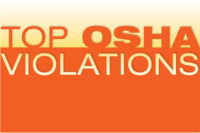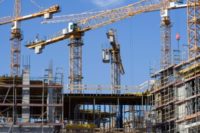Powered industrial trucks -- commonly called forklifts -- can raise or lower large objects, stack them on pallets or place them in crates. These versatile vehicles can either be ridden by the operator or controlled by a walking operator.
While there are many different types of powered industrial trucks, there is a common theme in OSHA inspection reports that led to 29 CFR 1910.178 being ranked the fifth-most frequently cited standard in 2014: training.
The standard requires employers to train and/or evaluate powered industrial truck operators to ensure that they are competent to safely operate the type of vehicle they are assigned to use, whether it is a sit-down counterbalanced rider truck, an operator-up counterbalanced front/side loader truck or a rough terrain forklift.
OSHA inspection totals
From October 2014 through September 2015, 2,176 OSHA inspections resulted in the issuance of 3,058 citations for violations of 1910.178, with a total of $4,530,912 in penalties assessed. The Fabricated Metal Product Manufacturing industry accounted for 434 citations and $478,966 in penalties, followed by Merchant Wholesalers, Durable Goods (267 citations, $354,467 in penalties). Specialty Trade Contractors earned 192 citations ($237,335 in penalties); Warehousing and Storage had 165 ($314,838); Wood Product Manufacturing also had 165 ($140,831) and Machinery Manufacturing had 137 ($111,317). Rounding out the top ten list were Merchant Wholesalers, Nondurable Goods (137 citations, $340,714); Nonmetallic Mineral Product Manufacturing (124, $152,095) and Food Manufacturing (113, $156,607).
Powered industrial trucks present hazards both to their operators and to those working in the vicinity of the trucks. For instance, sit-down, counterbalanced high-lift rider trucks are more likely than a motorized hand truck to be involved in a falling load accident, because they can lift loads much higher than hand truck. Lift trucks accidentally being driven off loading docks or falling between docks and an unsecured trailer can result in injuries, as can workers being struck by a lift truck.
Case studies
A review of OSHA inspections reveals some of the more common violations related to powered industrial trucks.
At its Processing and Distribution Center in Des Moines, Iowa, the U.S. Postal Service’s (USPS) was cited for failing to properly train workers about the hazards of powered industrial truck hazards. Additional citations were issued for failing to provide refresher training when workers were observed operating powered industrial trucks in an unsafe manner, to certify that workers were properly trained and to conduct an evaluation of each powered industrial truck operator at least every three years.
Bakery goods manufacturer Interstate Brands Corp. in Schiller Park, Illinois, was cited for failing to ensure all persons operating powered industrial trucks were properly trained and evaluated.
Continental Terminals, Inc. in Jersey City, NJ was cited for allowing employees at its Kearney warehouse to ride on the forks of forklifts, for allowing powered industrial trucks to be left unattended with a load raised and the engine running and for not taking power industrial trucks out of service when they were in need of repair. In addition, the company did not provide auxiliary directional lighting on powered industrial trucks for areas where the general lighting was less than two lumens per square foot. For those and other citations, OSHA proposed $162,400 in penalties against the company.
Interstate Brands Corp. in Schiller Park, Illinois, was cited for failing to ensure all persons operating powered industrial trucks were properly trained and evaluated.



